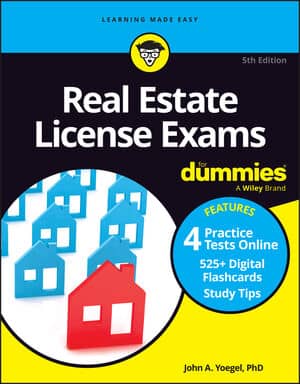 © create jobs 51 / Shutterstock.com
© create jobs 51 / Shutterstock.comReal estate laws can be extremely specific from one state to another and are ever-changing either by legislative action or court decree. So, as you’re researching these topics in your home state, try to get the most current and complete information you can find. Often you can go online to get your state’s latest version of its real estate license law. You can be assured that there will be questions on the exam based on what’s in that law. You also need to consult your prelicensing course textbook, handouts, and the instructor.
Agency law
Agency law, simply stated, is the law that governs the relationship between a client and an agent, in this case a buyer or seller and you their real estate agent. Every state has its own version of how it defines the relationship between a broker/salesperson and a client (the person represented by a broker/salesperson). Of all the state-specific exam information, agency law is perhaps the most complicated and the most important. Look for what your state has to say about the following topics:- Agency disclosure
- Buyer agency
- Buyer agency agreements
- Dual agency
- Listing agreements (including net listings)
- Transactional or facilitating brokerage
- Any other types of permitted or prohibited agencies in your state
Fair housing
In essence, the goal of fair housing laws is to prevent discrimination in housing sales and rentals. Most fair housing laws come from the federal government. Many states, however, and some municipalities, have supplemented the federal regulations with their own. The local rules and regulations usually are stricter than the federal rules. In the case of two different laws covering the same thing, the stricter law applies. Check out:- Protected classes: Federal fair housing laws cover a number of groups. You need to check out additional groups that are protected by fair housing standards in your state. For example, sexual orientation may be a protected class in your state even though it’s not a protected class in the federal law.
- Exceptions to the exceptions: Some municipalities may not permit the same exceptions to the rules that the federal government does.
- Additional prohibited activities: Federal law is pretty complete in addressing prohibited activities, but check out any supplemental state or local laws.
License law
Every state has its own procedures for obtaining and maintaining a real estate license. Find out everything you can about your state’s licensing law. Something as minute (and silly, in my opinion) as knowing the fee for filing a change of address has been asked on exams. So, study your state’s law carefully. You probably can check out your state license law online, and you may get a copy of it when you take your prelicensing course.Limitations on land use
A variety of local governmental controls govern how you use your property. Questions you may want to ask about local regulations include the following:- What board or agency adopts and amends the zoning ordinance?
- What board or agency grants variations (variances, special permits) from the zoning ordinance?
- What local procedures are required for approval of a subdivision and who or what board or agency gives the approval?
- What are the statutory time limits for protesting deed restriction violations?
- Are any statewide historic preservation programs or environmental review laws in effect?
- Does your state require you to know something about construction?
Money stuff
Money makes the world go round, including the world of real estate. A few things that you may want to check out in your state with respect to money issues include:- State-sponsored mortgage loan or guarantee programs that may make money available to homebuyers under favorable conditions like lower-than-normal interest rates
- Special incentive, rebate, or exemption programs for property taxes, such as a senior citizen tax exemption
- How you protest your property tax assessment
Ownership rights, forms, and theories
You may want to check out the following ownership issues in your home state:- The applicability of the following terms in your state: community property, curtesy, dower, and homestead
- Whether your state recognizes the right of survivorship in joint tenancy
- Whether the terms town house and condominium mean the same thing
- If your state is a title theory, lien theory, or intermediate theory state
- Whether your state uses tenancy by the entirety or some other form of ownership specific to married couples
Property disclosure
The general fiduciary duties (the overall responsibilities of an agent to a client) regarding disclosure of information to your principal or client (the person an agent represents) are pretty standard from state to state. The issue of what must be disclosed to the customer, which in most cases is the buyer, can vary. As an agent, you may want to check out the following responsibilities of an agent as well as an owner with respect to disclosure:- Latent defects
- Material defects
- Stigmatized property
- Megan’s Law
- Disclosure procedures
- Penalties
- Special environmental hazards, such as earthquake prone areas
Tenants’ rights and rent control
Check out any laws in your state that specifically guarantee certain protections to tenants in rental buildings. If any are in effect, they may be on a state level or an individual municipal level. These types of laws can cover anything from placement of window guards and other security features to notification about rent increases. Pay particular attention to the number of units a building must have for the laws to apply.The other thing to check out is whether your state or any municipalities in your state have laws that control rental rates and rent increases. I’m not talking about public housing here but rather control over rents in privately owned rental buildings. Check out what the rules are and to what buildings or tenants they may apply. And be aware that even within the same state, two ways for controlling rents may be in effect—one in the cities and one in the suburbs.
Transferring ownership involuntarily
Two state-specific factors to check out regarding the loss of property against your will are:- The statutory time period needed to claim adverse possession or prescriptive rights against someone else’s property.
- The laws of descent, which govern the distribution of your estate if you die intestate (without a will). Because as an agent you may help heirs dispose of real estate that they’ve inherited, many states want you to know something about these laws.
Transferring ownership voluntarily
Voluntary transfer of property ownership is the area where you’ll be spending most of your time after you get your real estate license. Perhaps the most important item you need to check out for the exam and for practical purposes is to what extent you’ll be involved in the legal side of things. In some places, real estate agents handle most, if not all, of the work in actually transferring ownership of the property from one person to another. In other parts of the country, attorneys pick up the ball right after an offer is accepted on a piece of property.Regardless of your role in the actual ownership transfer process, some of the specific things that you need to check out for your state’s exam include:
- The type of deed most commonly used.
- Requirements for a valid deed. These can vary a little from one state to another.
- The type of property description most commonly used in a deed.
- The use of title insurance, abstract of title, or other systems for certifying marketable title to the property.
- Who pays what closing costs?
- Who owns the property on the day of closing?
- Who’s responsible if the property is destroyed while under contract for sale?
- Whether property transfers commonly close in escrow.

